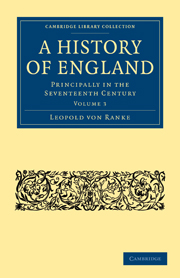Book contents
- Frontmatter
- Contents
- BOOK XI THE COMMONWEALTH IN ENGLAND, 1649—1653
- BOOK XII THE PROTECTORATE OF OLIVER CROMWELL, 1653–1658
- BOOK XIII FALL OF THE PROTECTORATE AND THE COMMONWEALTH. RESTORATION OF THE MONARCHY, 1658—1660
- BOOK XIV THE FIRST FIVE YEARS UNDER CHARLES II. THE RESTORATION OF THE ANGLICAN CHURCH
- CHAP. I The state of affairs at the Restoration
- CHAP. II The Convention Parliament in the summer of 1660
- CHAP. III Foreign policy. Marriages in the Royal Family
- CHAP. IV Religious differences. The Coronation. A new Parliament
- CHAP. V The first two years of the Long Parliament of the Restoration. The Act of Uniformity
- CHAP. VI Relations with France. Sale of Dunkirk
- CHAP. VII A scheme for reunion with Rome. Claim to the dispensing power. Personal relations in Court and State
- BOOK XV THE DUTCH WARS OF CHARLES II. ESTABLISHMENT OF THE PROTESTANT AND PARLIAMENTARY CHARACTER OF THE CONSTITUTION 1664—1674
CHAP. I - The state of affairs at the Restoration
Published online by Cambridge University Press: 07 June 2011
- Frontmatter
- Contents
- BOOK XI THE COMMONWEALTH IN ENGLAND, 1649—1653
- BOOK XII THE PROTECTORATE OF OLIVER CROMWELL, 1653–1658
- BOOK XIII FALL OF THE PROTECTORATE AND THE COMMONWEALTH. RESTORATION OF THE MONARCHY, 1658—1660
- BOOK XIV THE FIRST FIVE YEARS UNDER CHARLES II. THE RESTORATION OF THE ANGLICAN CHURCH
- CHAP. I The state of affairs at the Restoration
- CHAP. II The Convention Parliament in the summer of 1660
- CHAP. III Foreign policy. Marriages in the Royal Family
- CHAP. IV Religious differences. The Coronation. A new Parliament
- CHAP. V The first two years of the Long Parliament of the Restoration. The Act of Uniformity
- CHAP. VI Relations with France. Sale of Dunkirk
- CHAP. VII A scheme for reunion with Rome. Claim to the dispensing power. Personal relations in Court and State
- BOOK XV THE DUTCH WARS OF CHARLES II. ESTABLISHMENT OF THE PROTESTANT AND PARLIAMENTARY CHARACTER OF THE CONSTITUTION 1664—1674
Summary
Nations are not guided by comprehensive views, they are rather impelled by powerful feelings. Charles I had rendered himself unpopular by his encroachments upon the fundamental rights of the people, by undermining the constitution of Parliament, and by an apparent leaning towards Catholicism. But during the struggle with him the army and the bigoted sectaries had together established a rule far more distasteful still to the convictions and feelings of the nation. It was the dislike felt to a mode of government which disguised violence and oppression under the cloak of freedom that led to the restoration of the old constitution. The cry for a free Parliament, which was the first raised against the Commonwealth, was implicitly a demand for the monarchy.
It was on this state of feeling that the General relied, who had sided with the Commonwealth in its struggle with his fanatical rivals, but had since found that its own sectarian tendencies threatened danger to himself. Thoroughly soberminded, always prompt and resolute, and far-sighted enough to discern the course of affairs, and thus to retain the lead in his own hands, he secured free play for the general wishes and feelings of the people. Monk did not beget the Restoration, but he may be said to have assisted at its birth. While constantly engaged with the foes nearest at hand, he at the same time accomplished a higher duty, and obeyed the necessity of things, and, supported by the common consent of the nation, inaugurated a new era in the history of England.
- Type
- Chapter
- Information
- A History of EnglandPrincipally in the Seventeenth Century, pp. 311 - 321Publisher: Cambridge University PressPrint publication year: 2010First published in: 1875



